
International Journal of Electrochemical Science
Scope & Guideline
Exploring the electrochemical landscape of tomorrow.
Introduction
Aims and Scopes
- Electrochemical Energy Storage:
Research on batteries, supercapacitors, and fuel cells, focusing on materials such as lithium-ion, sodium-ion, and zinc-ion technologies, with an emphasis on improving efficiency, capacity, and cycling stability. - Corrosion Science and Inhibition:
Studies investigating the mechanisms of corrosion in various environments, the development of corrosion inhibitors, and methods for assessing corrosion resistance in metals and alloys. - Electrochemical Sensors and Biosensors:
The journal publishes work on the design, fabrication, and application of electrochemical sensors for detecting various analytes, including biomolecules, pollutants, and industrial chemicals, utilizing advanced nanomaterials and novel sensing strategies. - Electrocatalysis and Photocatalysis:
Papers explore the development of electrocatalysts for energy conversion reactions such as hydrogen evolution and carbon dioxide reduction, as well as photocatalytic materials for environmental remediation. - Nanomaterials in Electrochemistry:
Research focusing on the synthesis, characterization, and application of nanostructured materials in electrochemical systems to enhance performance and functionality. - Machine Learning and Data Analysis in Electrochemistry:
Studies that utilize machine learning techniques to analyze electrochemical data, predict performance, and optimize electrochemical processes.
Trending and Emerging
- Sustainable and Green Electrochemistry:
Research focusing on eco-friendly materials and processes, including the use of natural extracts as corrosion inhibitors and sustainable approaches to energy storage and conversion. - Advanced Nanomaterials:
The use of nanomaterials in electrochemical applications is on the rise, with a focus on their unique properties for enhancing the performance of sensors, batteries, and catalysts. - Electrochemical Water Treatment:
Emerging studies on the use of electrochemical methods for wastewater treatment, including advanced oxidation processes and pollutant degradation, are gaining attention as sustainability becomes a priority. - Smart and Wearable Electrochemical Sensors:
The development of miniaturized, flexible, and wearable sensors for real-time monitoring of health parameters and environmental pollutants is a rapidly growing area, driven by advancements in materials science. - Artificial Intelligence in Electrochemistry:
The application of machine learning and artificial intelligence to optimize electrochemical processes, analyze data, and predict outcomes is becoming increasingly prominent, representing a significant trend in the field.
Declining or Waning
- Traditional Corrosion Studies:
Research focused solely on traditional corrosion mechanisms without the integration of modern computational tools or eco-friendly inhibitors is becoming less common as the field shifts towards more innovative, sustainable approaches. - Basic Electrochemical Theory:
Papers centered around basic electrochemical theory without application to current technological advancements or practical applications are less frequently published, as the emphasis moves towards applied research. - Conventional Battery Technologies:
Research on conventional battery technologies that do not incorporate novel materials or innovative designs is declining, as there is a strong push towards exploring new battery chemistries and architectures. - Single-Use Electrochemical Sensors:
The interest in single-use sensors is decreasing as more emphasis is placed on developing reusable and multifunctional sensor platforms that can provide more comprehensive data.
Similar Journals

International Journal of Corrosion and Scale Inhibition
Empowering Researchers to Combat CorrosionInternational Journal of Corrosion and Scale Inhibition (ISSN: 2305-6894, E-ISSN: 2305-6894), published by VSEROSSIISKAYA ASSOTSIATSIYA KORROZIONISTOV, is a distinguished open-access journal dedicated to advancing knowledge in the critical fields of corrosion science and material degradation processes. Established in 2012, this journal serves as a vital platform for researchers, professionals, and students aiming to explore innovative solutions to corrosion-related challenges across diverse industries. Located in the Russian Federation, it boasts commendable rankings, placing it in the Q2 category for both Materials Chemistry and Metals and Alloys, signifying its significant impact within the scientific community. With a robust Scopus ranking—a commendable 40th out of 176 in Materials Science for Metals and Alloys and 120th out of 317 in Materials Chemistry—the journal highlights its pivotal role in disseminating research that shapes the future of material durability and sustainability. By fostering open access to scholarly work, the journal ensures that critical findings are accessible to a broad audience, thereby promoting knowledge sharing and collaboration in the quest to mitigate corrosion and enhance material performance.
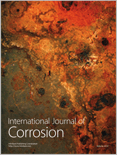
International Journal of Corrosion
Advancing the Science of Corrosion for a Sustainable FutureInternational Journal of Corrosion is a distinguished peer-reviewed journal published by HINDAWI LTD, focusing on the critical field of corrosion research, a vital aspect of materials science and chemical engineering. Since becoming an Open Access journal in 2010, it has provided a platform for disseminating pivotal findings related to corrosion mechanisms, prevention strategies, and innovative materials designed to counteract corrosion, thus directly impacting industries ranging from construction to energy. The journal boasts a respectable impact reflected in its Scopus rankings, holding a Q3 quartile in both Materials Science and Process Chemistry and Technology, with commendable rankings of #157 out of 463 and #37 out of 73, respectively. By fostering knowledge exchange and collaboration among researchers, professionals, and students, the International Journal of Corrosion plays an essential role in advancing the understanding of corrosion phenomena, thereby contributing significantly to the development of more resilient materials and sustainable engineering practices.
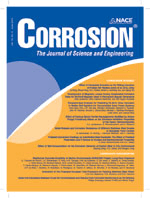
CORROSION
Unveiling Insights for Sustainable Engineering PracticesCORROSION is a prestigious journal published by the Natal Association of Corrosion Engineers, dedicated to advancing the understanding of corrosion phenomena in various materials across multiple industries. With a strong commitment to high-quality research, it has established itself as a key resource in the fields of Chemical Engineering, Chemistry, and Materials Science, as reflected in its Q3 ranking in the 2023 category quartiles. This journal, retaining its relevance since 1969, serves as a platform for innovative studies and findings that address fundamental and applied aspects of corrosion, vital for professionals engaged in material selection and integrity management. Through access to state-of-the-art research, CORROSION significantly contributes to the safety, sustainability, and efficiency of engineering practices worldwide. Researchers, professionals, and students alike can benefit from the insights offered by this journal, driving forward the quest for innovative solutions in corrosion management.
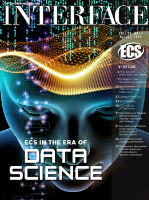
Electrochemical Society Interface
Transforming Electrochemical Discoveries into Practical AdvancesElectrochemical Society Interface is a prominent journal within the field of electrochemistry, published by the Electrochemical Society Inc. The journal, carrying the ISSN 1064-8208 and E-ISSN 1944-8783, serves as a vital platform for researchers, professionals, and students alike, aiming to bridge the gap between cutting-edge research and practical applications in the electrochemical domain. With a convergence period spanning from 1992 to 2024, the journal enjoys a respectable ranking in the Q3 Quartile of the 2023 Electrochemistry category. Although it does not currently offer open access options, its articles provide valuable insights into various aspects of electrochemical research and technology, enhancing the scholarly communication in this important field. By maintaining high standards in research dissemination, Electrochemical Society Interface continues to foster innovation and contributes significantly to the developments in electrochemical processes and materials.
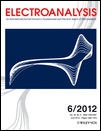
ELECTROANALYSIS
Pioneering Insights in Analytical and Electrochemical ScienceELECTROANALYSIS is a premier journal published by WILEY-V C H VERLAG GMBH that serves the dynamic field of analytical and electrochemistry. Established in 1989, this scholarly publication has successfully converged its focus to cover a wide array of topics including novel electrochemical methods, sensor technology, and environmental analysis, reflecting the latest advancements and trends in the field. With an impressive 2023 impact factor that places it in the Q2 quartile of Analytical Chemistry and Q3 quartile in Electrochemistry, the journal is recognized for its high-quality research and contributions. Its Scopus rankings further reinforce its credibility, standing at #46/156 in Analytical Chemistry and #26/60 in Electrochemistry. Although currently not offering Open Access, the journal remains a significant resource for researchers, professionals, and students keen to stay at the forefront of electroanalytical techniques. With a global readership, ELECTROANALYSIS continues to drive knowledge and innovation within the scientific community.

RARE METALS
Harnessing Knowledge for Material ProgressRARE METALS is a prestigious journal at the forefront of materials science, dedicated to advancing the understanding of metallic materials and their applications. Published by the Nonferrous Metals Society of China, this journal has established itself as a leading platform for cutting-edge research in areas including condensed matter physics, materials chemistry, metals and alloys, and physical and theoretical chemistry. With an impressive impact factor and consistently ranked within the Q1 quartile across multiple categories, RARE METALS ranks highly on Scopus, illustrating its significant contribution to the field—such as a remarkable rank of 11/176 in Materials Science for Metals and Alloys and 23/434 in Condensed Matter Physics. Although it operates under a subscription model, its rigorous peer-review process ensures that only the most impactful research is published, making it an essential resource for researchers, professionals, and students engaged in material innovation. Join the global network of materials science by contributing to or exploring the wealth of knowledge RARE METALS offers, fostering advancements in areas vital for technological progress and industrial applications.

JOURNAL OF THE ELECTROCHEMICAL SOCIETY
Unleashing the Potential of Electrochemical ApplicationsJOURNAL OF THE ELECTROCHEMICAL SOCIETY, published by the ELECTROCHEMICAL SOCIETY INC, is a leading peer-reviewed academic journal dedicated to advancing the field of electrochemistry and its myriad applications. With an ISSN of 0013-4651 and E-ISSN of 1945-7111, this esteemed journal has been a pivotal platform for research since its inception in 1948, with convergence periods allowing for a rich historical context of study through to 2024. Recognized for its high impact, it holds a noteworthy Q1 ranking in several categories including Condensed Matter Physics and Materials Chemistry, and it is Q2 ranked in both Electrochemistry and Renewable Energy. This journal features a range of articles that encompass both theoretical and experimental advancements, making it a crucial resource for researchers, professionals, and students keen on exploring cutting-edge developments in materials science, energy solutions, and sustainable technologies. Although it is not an open access journal, its rigorous standards ensure that published work significantly contributes to the body of knowledge within its fields, fostering innovative research and collaborative progress.

RUSSIAN JOURNAL OF ELECTROCHEMISTRY
Unveiling Innovations in Electrochemical ApplicationsThe Russian Journal of Electrochemistry, published by Pleiades Publishing Inc, is a reputable scientific resource that caters to the dynamic field of electrochemistry. Since its inception in 1996, this journal has become a platform for the dissemination of cutting-edge research, exploring both foundational studies and innovative applications within electrochemical science. Despite currently holding a Q4 categorization in its field, the journal is dedicated to enhancing its scholarly impact and visibility, reflecting its commitment to fostering advancements in electrochemical technologies. With its ISSN 1023-1935 and E-ISSN 1608-3342, the journal strives to reach a global audience of researchers, professionals, and students alike. Though the journal is not open access, its contents are crucial for anyone looking to stay at the forefront of electrochemical research and developments. The journal's editorial board includes well-respected experts, ensuring that published articles contribute significantly to the scientific community and pave the way for future innovations in the field.
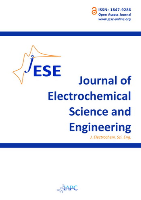
Journal of Electrochemical Science and Engineering
Advancing the Frontiers of Electrochemical Research.The Journal of Electrochemical Science and Engineering, published by the International Association of Physical Chemists (IAPC), serves as a vital resource for researchers and professionals in the fields of electrochemistry, materials chemistry, and chemical engineering. With an Open Access model since 2011, this journal ensures that groundbreaking research is freely accessible to a global audience, promoting collaboration and knowledge sharing. Situated in Croatia, it showcases cutting-edge developments while focusing on applied aspects related to electrochemical technologies. Notably, the journal holds a commendable Scopus ranking, placing it within the Q3 quartile for multiple categories, including Chemical Engineering (miscellaneous) and Electrochemistry. By fostering innovative research and comprehensive reviews, the Journal of Electrochemical Science and Engineering plays a crucial role in advancing the understanding and application of electrochemical processes, making it an indispensable platform for academics and practitioners alike.

ELECTROCHEMISTRY
Fostering Collaboration in Electrochemical ResearchELECTROCHEMISTRY is an esteemed journal published by the Electrochemical Society of Japan, dedicated to advancing the field of electrochemical science and technology. With an ISSN of 1344-3542 and an E-ISSN of 2186-2451, this journal has been providing a platform for scholarly communication since its inception in 1996, with a converged scope extending to 2024. As an Open Access publication since 2020, it facilitates the wide dissemination of research, fostering collaboration among researchers, professionals, and students alike. Currently positioned in Q3 of the electrochemistry category and ranking 52 out of 60 in Scopus, ELECTROCHEMISTRY is committed to publishing high-quality, peer-reviewed articles that explore novel electrochemical systems, applications, and methodologies. With its base in Tokyo, Japan, the journal serves a global audience, promoting cutting-edge research that drives innovation in energy, materials science, and analytical chemistry.